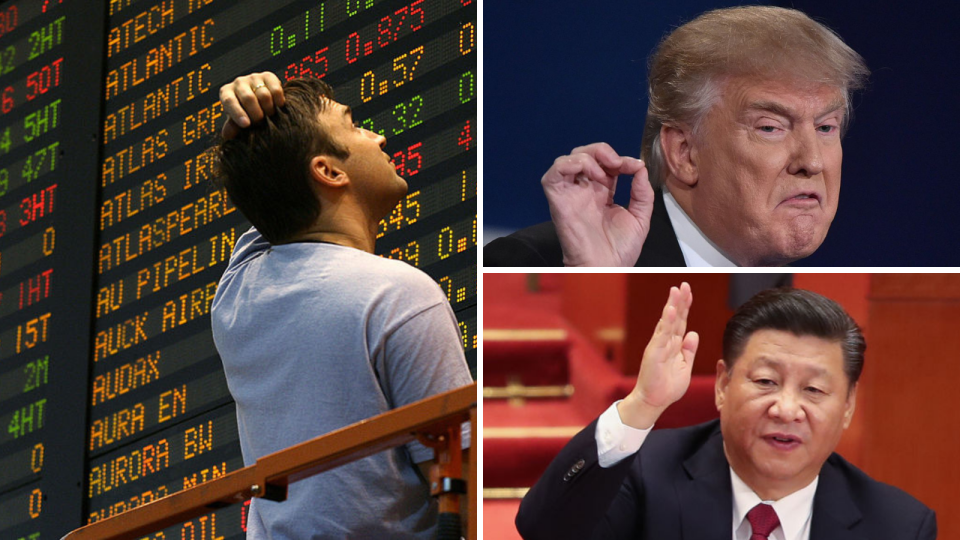Bloodbath for share markets: Here’s how it affects you

Australia's share market has struggled to recover its early losses as it emerges as one of the biggest losers from the intensifying US-China trade war.
The benchmark S&P/ASX200 index was down 162.3 points, or 2.44 per cent, to 6,478 points at 1200 AEST on Tuesday, while the broader All Ordinaries was down 166.9 points, or 2.49 per cent, to 6,543.7 points.
The fall comes off the back of a significant drop on Wall Street overnight.
US’ three major indices all ended the day in the red, with the Dow Jones Industrial average down 2.9 per cent, the S&P 500 down 2.98 per cent and the Nasdaq Composite down 3.47 per cent.
As it happened – Tuesday: ASX tumbles at open after Wall St sell-off
As it happened – Monday: ASX drops 128 points in worst loss of 2019
Coalition win: The numbers after the election: ASX hits 11-year high, AUD bounces
Why have share markets fallen?
Put simply, the US and China have triggered a selloff as the trade war steps up a notch.
What’s happened?
The People’s Bank of China has set the yuan to the weakest level in eight months and China’s Commerce Ministry has said Chinese companies would no longer buy US agricultural products.
A weaker yuan threatens US businesses that trade in China as it pushes up the cost of US goods for Chinese consumers.
Investors are now speculating whether this is a direct response to US President Donald Trump’s new 10 per cent tariffs on US$300 billion (A$442.44 billion) of Chinese imports.
Trump himself slammed China’s move saying it was a “currency manipulation” and a “major violation” in response to the Asian nation’s move to allow its currency to fall to an almost-historic low against the US dollar.
China dropped the price of their currency to an almost a historic low. It’s called “currency manipulation.” Are you listening Federal Reserve? This is a major violation which will greatly weaken China over time!
— Donald J. Trump (@realDonaldTrump) August 5, 2019
How does this affect Australia?
Speaking to Yahoo Finance, CommSec chief economist Craig James noted that there did not seem to be any end in sight for the escalating US-China trade war, and that there are implications for global growth.
The concern is that the two biggest trading nations on the planet are at war with one another on trade, which then reduces the potential for global growth, James explained.
“If that’s the case then it [weighs on] the profitability of major companies around the world.”
“That’s why we’ve seen share markets weaken significantly. We don’t know where this one’s going to be resolved from.”
Weaker global growth will have a ripple effect on Australia
Australia will be caught up in the fall-out if global economic growth takes a hit, experts warn.
“If there is slower economic growth then that means less demand for our exports, and that can mean slower economic growth in Australia,” AMP Capital chief economist Shane Oliver told Yahoo Finance.
Not only that, if growth slows significantly, there could be a mass loss of jobs, Oliver indicated.
“The risk of all of this slower growth in Australia could mean higher unemployment if it turns bad.”
But there’s no need for panic
Economists are widely expecting the Reserve Bank to cut interest rates again this year, which will provide some offset to the threat to global growth, Oliver explained.
When it comes to the sell-off of shares on the ASX and Wall Street, both Oliver and James took a laid-back approach.
“It is quite normal for share markets to go through corrections every so often,” Oliver said.
“It doesn’t necessarily mean Australia’s going to go into recession, but obviously it’s a risk.”
Ultimately, it depends on how long China and the US take to sort out their differences: the longer they take, the greater the risk, Oliver said.
James agreed, adding that there is no way of knowing how long trade war tensions would play out, noting the volatile nature of the trade spat.
“It would take one positive tweet from President Trump and we could see share markets rallying again,” James told Yahoo Finance.
“We need to watch developments in the coming days and weeks.”
He added that it was not helpful to get “too wrapped up” in the short-term movement of share markets.
“We should stand back and look at the big picture, and always got to remember where we've come from. Only a week ago, the Australian share market was at record highs,” James said.
Make your money work with Yahoo Finance’s daily newsletter. Sign up here and stay on top of the latest money, news and tech news.

 Yahoo Finance
Yahoo Finance 
